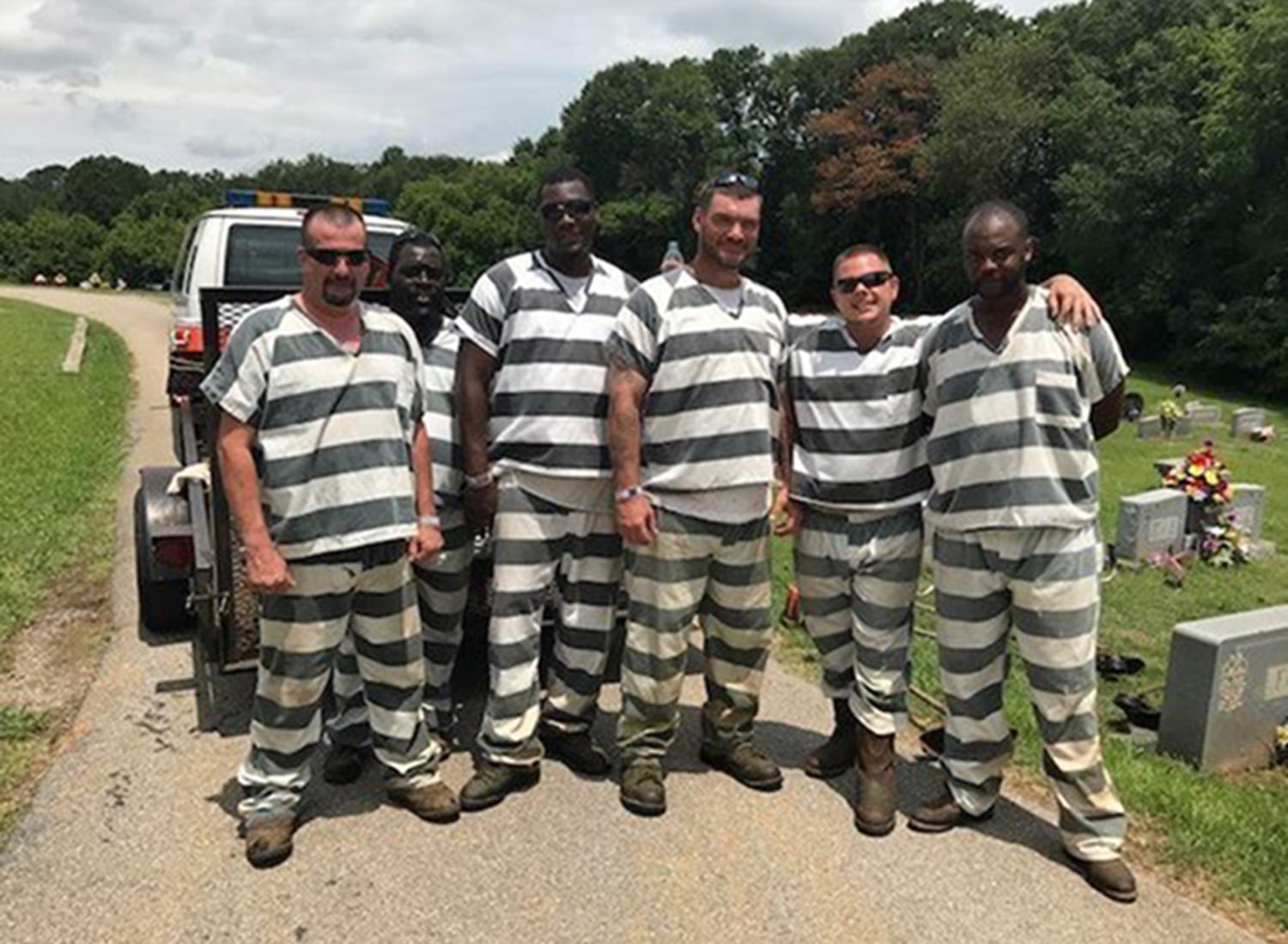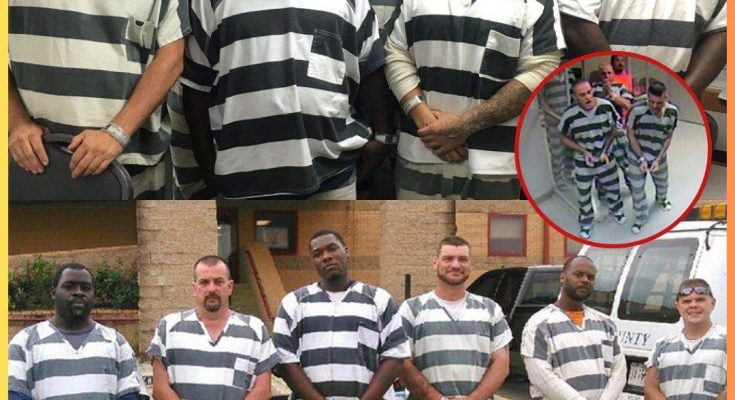Inmates Who Chose to Save a Life: A Story of Humanity Behind Bars

When we think of prisons, the image that often comes to mind is one of confinement, punishment, and a strict division between guards and inmates. It’s easy to imagine a world where resentment brews on both sides, where trust is a luxury few can afford, and where humanity is buried under the weight of rules, authority, and fear. But sometimes, in the most unlikely of places, we see acts of pure human compassion that transcend the walls, labels, and expectations. This is one such story—a story about six inmates who defied the odds, put aside their differences, and demonstrated that even in the most difficult of circumstances, the human spirit can rise above all.
It was a regular day in the yard. The six men were cutting grass—tasks that are often assigned to inmates as part of their daily routine. It was a job they had done many times before, but on this day, something extraordinary happened. Their guard, a figure of authority they were supposed to be wary of, suddenly collapsed. His body hit the ground with a sickening thud, and in a moment that seemed to freeze time, it was clear that he was in trouble.
The guard’s breath was shallow. There was no pulse. He was seconds away from death.
In a split second, the inmates found themselves standing over a man who was as much their enemy as he was their fellow human being. They could have run. They could have grabbed the gun that lay on the ground beside the fallen guard. They could have taken the truck keys and driven off to freedom. They had every opportunity to escape, and no one would have known. But in that moment, they made a decision—a decision that would not only save a life but also change the way they viewed each other and themselves.

The Choice to Save a Life
The choice to act was instantaneous. The inmates didn’t hesitate. They dropped everything they were doing and rushed to the guard’s side. They didn’t look at him as a symbol of authority, nor did they see him as their captor. In that crucial moment, the boundaries between guards and inmates disappeared. All that mattered was that a human life was in danger, and they were the ones who could save it.
They quickly tore off the guard’s bulletproof vest, which was constricting his ability to breathe. They began chest compressions, working together as a team, despite the fact that they had no formal training in first aid. They called 911, their voices shaking with urgency as they relayed the situation to the dispatcher. They stayed by the guard’s side, working tirelessly, waiting for the paramedics to arrive. No one reached for the gun. No one tried to flee. They acted purely out of instinct and compassion.
“We didn’t see a guard and inmates,” one of the men later said. “We saw a man dying. And we had to help.”
This act of compassion, of choosing to save a life despite everything they had been through, is a testament to the incredible capacity for kindness that resides within every human being, no matter their background, their past, or the circumstances they find themselves in. It was a choice that defied the norms of the prison system—a system that often dehumanizes individuals and places them into rigid categories. But in that moment, these six men reminded us that humanity is not defined by labels; it is defined by actions.
Breaking Down Barriers
In the days following the incident, the prison community was abuzz with talk of what had happened. The story of how six inmates had saved the life of a guard quickly spread, and it made everyone stop and think. In a place where animosity and tension often run high, this act of bravery and selflessness was nothing short of revolutionary.
The decision to help the guard was not just a physical action; it was a symbolic one. It broke down the barriers that divide individuals based on their status, their role, and their perceived power. These inmates, who were used to being seen as the lowest of society, showed that they were capable of the highest form of humanity: compassion.
For the guard who had collapsed, it was a life-changing experience as well. He had gone from being the authority figure, the one in charge, to the one needing help. And in his moment of vulnerability, it was the very people he was supposed to control who stepped up to save him. In a way, this experience turned the usual power dynamics on their head. It was a reminder that all people, no matter their status or role, are interconnected in their humanity.
But the ripple effect didn’t stop there. The story of the inmates who saved the guard’s life sparked important conversations about the power of compassion in the prison system. Could this act of kindness be a turning point? Could it serve as a model for a more humane approach to corrections, one that focuses on rehabilitation rather than punishment?
The Power of Redemption
The story of these six inmates is also one of redemption. Many individuals in the prison system have been written off by society. They are often seen as the product of their mistakes, defined by their crimes and their pasts. But what this story illustrates is that redemption is not a one-time event; it is a process that can unfold in surprising ways.
In this case, the inmates’ decision to save the guard was an act of redemption, not just for themselves but for the larger community. It showed that even those who have made grave mistakes are capable of extraordinary acts of kindness and courage. It demonstrated that people can change, that they can grow, and that their actions can define them far more than their past mistakes ever will.
This act of saving a life also offers a glimpse into the power of second chances. Inmates are often given little opportunity to demonstrate their capacity for good, and when they do act selflessly, it can have a transformative effect on both themselves and those around them. This incident shows that the prison system, at its core, should be focused on rehabilitation and reintegration, not just confinement and punishment. By offering individuals the chance to contribute positively, to help others, and to show their humanity, we can help them realize their full potential.
The Aftermath: A Changed Perspective
In the aftermath of the incident, the six inmates were praised for their quick thinking and bravery. The guard, whose life had been saved, made a full recovery. For the inmates, however, the experience was life-changing. It wasn’t just about saving a life—it was about realizing that they were more than the crimes they had committed, more than the labels placed on them by society. They had done something that very few could imagine doing: they had put the life of another human being above their own self-interest.
The prison system, too, was forced to confront the deeper question of what it means to rehabilitate individuals. It’s easy to dehumanize people when they are in prison, but moments like this remind us that every person is capable of good, no matter their past. The act of saving the guard’s life proved that redemption is not only possible—it can be life-saving, both for the person who seeks it and for those they encounter along the way.
The Greater Message: Compassion Over All
At the heart of this story lies a powerful lesson: compassion can change everything. It can bridge the gap between perceived enemies. It can heal wounds. It can create bonds where there were once divisions. And it can remind us that we are all human—each of us capable of kindness, no matter the circumstances.
The inmates’ decision to help the guard, despite having every opportunity to escape, is a reminder that we all have the ability to choose our actions. In a world where so much seems divided, this story stands as proof that, when given the chance, people will choose to act out of kindness and empathy. And when we do, we change the world in ways that go beyond words, beyond laws, and beyond expectations.
It’s a story of what happens when we choose to see each other not as categories—guards and inmates—but as human beings, all of us connected by the same fundamental need for love, respect, and compassion.
Conclusion: A New Beginning
The six inmates who saved a guard’s life that day didn’t just save a person’s life—they gave a powerful lesson to the world. They reminded us all that no matter our circumstances, we are capable of extraordinary acts of kindness. And sometimes, the greatest acts of courage come from those least expected. This story is one of redemption, humanity, and the unbreakable bond that connects us all.



